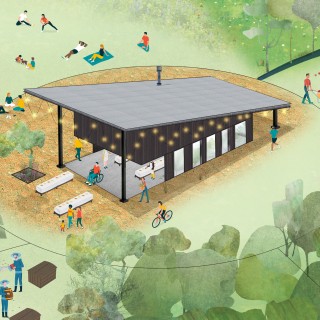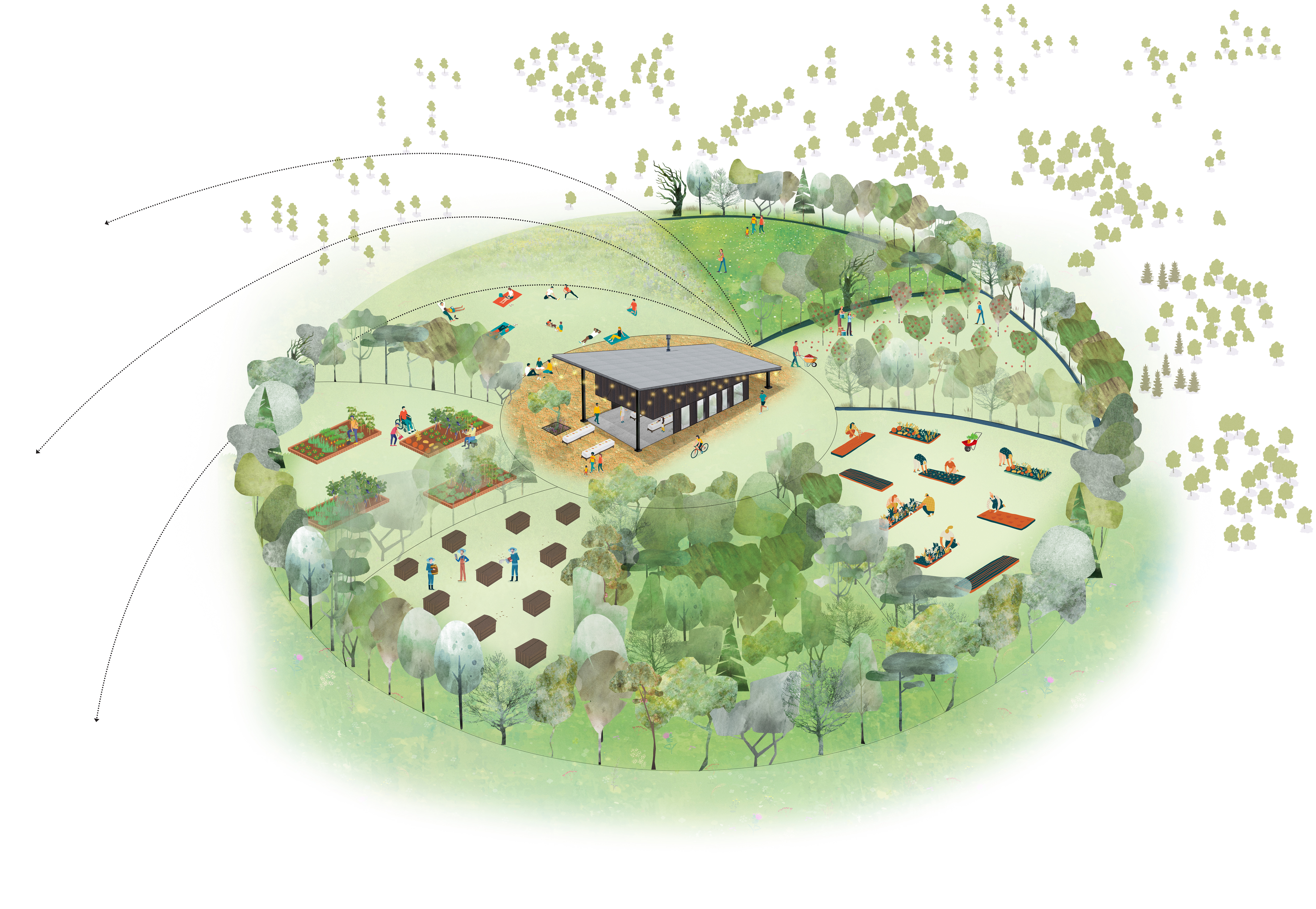
William Sutton Prize
- Landscape Architecture / Masterplanning / News Written by Christopher GrayIn January 2022, OPEN were shortlisted for the William Sutton Prize 2021. The William Sutton Prize was developed by Clarion Housing Group, the UK’s largest provider of affordable housing, to celebrate the legacy of its founder, William Sutton, as a 19th century innovator and philanthropist who bequeathed his fortune to improve the quality of social housing. OPEN’s entry into the Sustainability and Placemaking category proposes a “Community Green Hub Toolkit” which could be used by Clarion (and others) to provide a range of life-improving experiences and facilities via community growing and initiatives with the aim of connecting people with their natural environment.

The Community Green Hub Toolkit will create an inspirational, multi-scale planning and design resource which can be used by Clarion (and others) to provide a range of life-improving experiences and facilities via community growing and initiatives with the aim of connecting people with their natural environment. Our submission is an outline toolkit which would be further refined and expanded should we win.
The ideas set out here are a combination of well-established principles relating to community growing processes and blue-green infrastructure along with early-stage ideas for innovative community ‘hubs’ which tie together different components of the toolkit. These components combine in a way which is new but necessary in the context of the Climate Emergency and offer an alternative way to consider the value of open space which surrounds our established and emerging communities.
The aim is for a toolkit, which can be applied across a range of scales, from small established communities who want to have more involvement with growing and nature within their own home and garden, up to planned new garden settlements where numerous neighbourhood growing hubs will be required to provide for an entirely new community. The range of potential beneficiaries is therefore huge and varied, from individual residents who might be in an existing Clarion property to community interest groups who wish to work the land on a larger scale, benefiting collectively from what can be produced and grown in the public land around them, while improving the biodiversity and health of their neighbourhoods.

OPEN has worked for years on projects where landscape and nature are fundamental building blocks, whether delivered through landscape architecture, large-scale masterplans or architecture. We are frequently involved in the planning of communal growing spaces and have identified a need for a more comprehensive and holistic approach when considering such important community resources.
We are in unprecedented times and the twin challenges of the Global Climate Emergency and the repercussions of the Global Pandemic are impacting every aspect of life – it is not an exaggeration to say that things should never be the same again. Addressing both problems is everyone’s responsibility and should be at the forefront our minds when creating new places and supporting existing communities.
We all have recently spent more time at home, the importance of where and how we live has been questioned as never before. In addition to the design of our physical homes there has been a welcome (and long overdue) recognition of the importance of the surrounding landscape and environment within which our homes are set. Access to these outdoor spaces for growing, to meet family and friends, for exercise and to experience nature has never been more important to improving our health and wellbeing.
Clarion are in a unique position to directly influence the lives of many thousands of people through the policies and working practices they adopt. The proposed toolkit would fill an identified gap to provide access for all to growing facilities and opportunities to interact with the surrounding environment.

OPEN have co-worked with residents and local communities across the country on the design and implementation of a wide variety of projects and therefore have a huge wealth of knowledge as to appropriate collaborative processes and how to empower the communities to make decisions. Many of the proposed toolkit components have been previously tried and tested with existing communities and therefore we propose that the most appropriate time for engagement on the toolkit is at the point where a site or opportunity has been developed and these various components can start to be assembled together and refined into a site-specific solution.
For larger-scale projects where the toolkit is used as a starting point, we would propose to partner with a local community growing group or related charity in order to co-design the facility, aiming to create a partnership relationship between the community groups and Clarion; the ultimate aim is that the community itself takes stewardship of the place and is left with the capability for ongoing decision-making. For smaller-scale implementations, engagement would be with individual residents to understand their requirements and help them make their own decisions about what types of tools/opportunities are best for their own particular requirements and circumstances. Individuals and communities alike need to feel that they can take ownership of their own open spaces and aspects of the countryside, and the toolkit will help empower then with the necessary skills and information to consider how they engage with the natural world around us.

The Toolkit includes several components which could be directly used by individual residents in their own homes and gardens and further rolled out at scale across Clarion’s portfolio. Where these components are physical objects, they could be manufactured in volume and widely distributed to maximise positive impact. Where components are related to natural products (seeds, seedlings, nursery stock) then Clarion could partner with a plant nursery to secure a regular supply of stock which could be distributed in larger initiatives. This Clarion ‘nursery’ could be established on Clarion land and become a company-wide resource, not only for stock, but for expertise in growing and planting which could be disseminated across the group to embed knowledge at all levels.
The long-term vision and ‘big picture potential’ for the idea is where all aspects of the toolkit are integrated into a holistic Community Green Hub which brings together a number of important threads including:
- facilities for various scales and ways of growing fruit and vegetables;
- provision to support Biodiversity Net Gain (BNG);
- education on existing and new natural ecosystems; and
- creation of healthy landscapes and associated access.
